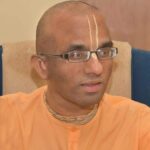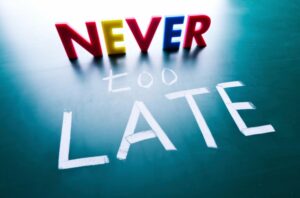It Is Never Too Late
SPIRITUALITY, 8 Feb 2021
Chaitanya Charan das | The Spiritual Scientist – TRANSCEND Media Service
Sometimes we feel that life has passed us by, that it is now too late to do many of the things we wanted to achieve in our life. Such thoughts demoralize us and prevent us from taking the small incremental steps on the path to improvement that may still be possible for us.
Amidst such demoralization, Gita wisdom offers consolation and inspiration with the insight that it is never too late because we are eternal. We are at our core indestructible souls who continue to exist even after the destruction of our bodies. With this spiritual worldview, we understand that we will always have opportunities to improve – if not in this lifetime, then in a future lifetime. Such understanding causes hope eternal to spring in our heart. Being animated by this hope, we can resist the temptation to quit.
When we keep trying determinedly, we are often pleasantly surprised to discover that we are able to do many of the things that we had thought were beyond us. Undoubtedly, certain achievements depend on certain material conditions; if those conditions are changed irrevocably, then those achievements may become impossible. A sports player who grows too old to play can’t become a champion in that sport.
Thankfully however, this irrevocability applies only to material achievements, not spiritual achievements. The summit of all spiritual achievements is to connect lovingly with Krishna, our all-attractive Lord whose parts we are eternally, and to rejoice forever in that connection. The opportunity to develop that spiritual connection always stays with us, no matter how many material things are taken away from us.
Thus, the spirit of the statement that we are never too late applies most realistically to our spiritual growth. The Bhagavad-gita explains that the soul never ages. Being eternal, it exists beyond time. And realizing ourselves to be souls opens the door to a fulfillment that exists beyond time, a fulfillment that is never too late to pursue and achieve. Learning to live as souls by practicing yoga, especially bhakti-yoga, raises our vision beyond bodily pleasures. Such pleasures become too late to enjoy when our body ages and loses its capacity to enjoy. Even when the body has that capacity, those pleasures remain at best fleeting and unfulfilling.
When we internalize Gita wisdom, we realize that life has much more to offer us than what we had been taught to believe by our prevailing materialistic culture. Life is meant for redirecting our love from the world to the source of the world, the all-attractive supreme, Krishna. When we learn to purify our heart and center it on him, we find ourselves becoming that which is our hearts’ deepest calling.
Ultimately, life’s greatest achievement is not in getting or doing – it is in becoming. Or more precisely, it is a becoming by which realize our being. As souls, we are, by our very nature, blissful beings. Only because we misidentify with our physical bodies and become attached to worldly objects do we become oblivious to our innate blissfulness. We become aware of our essential identity and the concomitant joyfulness by practicing bhakti-yoga. And as bhakti-yoga, the path of eternal spiritual love, is the perennial calling of the deepest layer of the human heart, it is not dependent on anything material, not even age.
So, yes, it is never too late for us to be what we were meant to be – spiritually realized individuals contributing harmoniously to the all-attractive whole and therein relishing sublime, supreme fulfillment.
Explanation of article:
______________________________________________
 Chaitanya Charan is a monk and an author. He has a degree on electronics & telecommunications engineering and served as a software engineer in a prominent multinational. However, he felt inspired to dedicate his life to sharing the spiritual wisdom of the Bhagavad-gita under the aegis of ISKCON (International Society for Krishna Consciousness). He is a member of ISKCON’s leading intellectual body, the Shastric Advisory Council, and is the associate-editor of its global magazine, Back to Godhead. He travels the world giving talks on spiritual subjects in universities such as Princeton, Harvard, Stanford and Cambridge and companies such as Intel, Google, Amazon and Microsoft. See Chaitanya Charan’s talks across the world. His articles have been published in many national newspapers including Indian Express, Economic Times and Times of India. He is the author of twenty-five books on spirituality.
Chaitanya Charan is a monk and an author. He has a degree on electronics & telecommunications engineering and served as a software engineer in a prominent multinational. However, he felt inspired to dedicate his life to sharing the spiritual wisdom of the Bhagavad-gita under the aegis of ISKCON (International Society for Krishna Consciousness). He is a member of ISKCON’s leading intellectual body, the Shastric Advisory Council, and is the associate-editor of its global magazine, Back to Godhead. He travels the world giving talks on spiritual subjects in universities such as Princeton, Harvard, Stanford and Cambridge and companies such as Intel, Google, Amazon and Microsoft. See Chaitanya Charan’s talks across the world. His articles have been published in many national newspapers including Indian Express, Economic Times and Times of India. He is the author of twenty-five books on spirituality.
Go to Original – thespiritualscientist.com
Tags: Bhagavad-gita, Inspirational, Mental Health, Spirituality
DISCLAIMER: The statements, views and opinions expressed in pieces republished here are solely those of the authors and do not necessarily represent those of TMS. In accordance with title 17 U.S.C. section 107, this material is distributed without profit to those who have expressed a prior interest in receiving the included information for research and educational purposes. TMS has no affiliation whatsoever with the originator of this article nor is TMS endorsed or sponsored by the originator. “GO TO ORIGINAL” links are provided as a convenience to our readers and allow for verification of authenticity. However, as originating pages are often updated by their originating host sites, the versions posted may not match the versions our readers view when clicking the “GO TO ORIGINAL” links. This site contains copyrighted material the use of which has not always been specifically authorized by the copyright owner. We are making such material available in our efforts to advance understanding of environmental, political, human rights, economic, democracy, scientific, and social justice issues, etc. We believe this constitutes a ‘fair use’ of any such copyrighted material as provided for in section 107 of the US Copyright Law. In accordance with Title 17 U.S.C. Section 107, the material on this site is distributed without profit to those who have expressed a prior interest in receiving the included information for research and educational purposes. For more information go to: http://www.law.cornell.edu/uscode/17/107.shtml. If you wish to use copyrighted material from this site for purposes of your own that go beyond ‘fair use’, you must obtain permission from the copyright owner.
